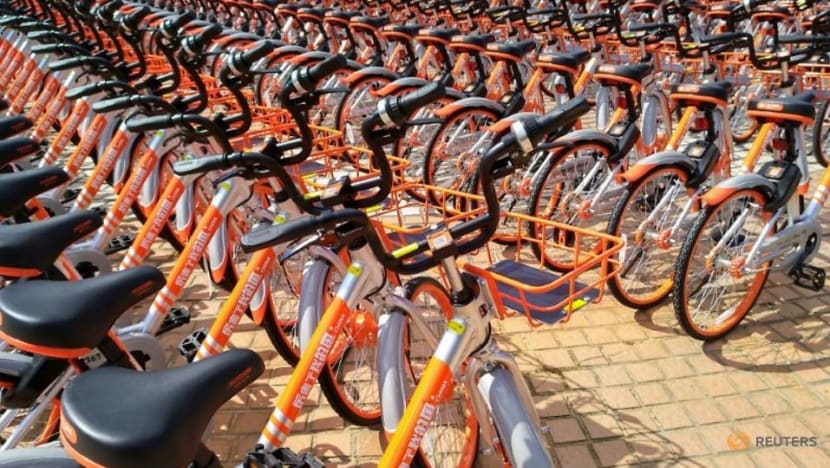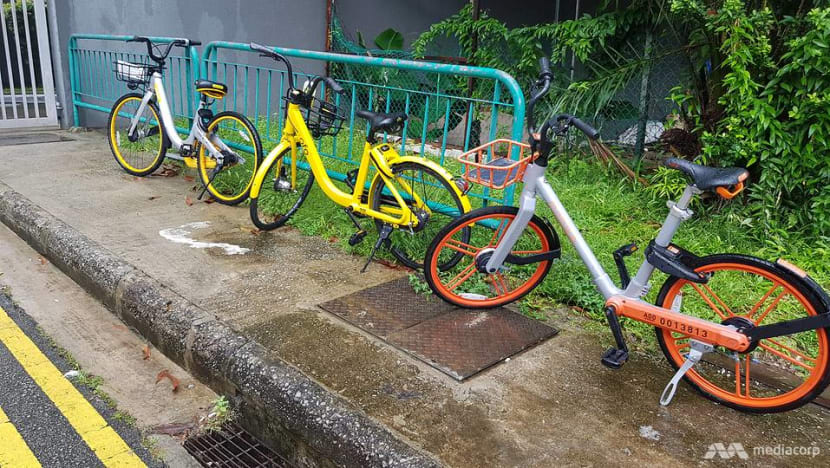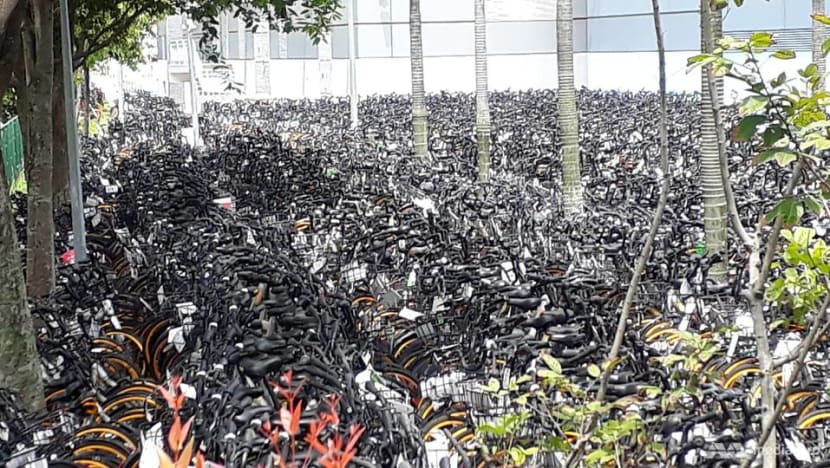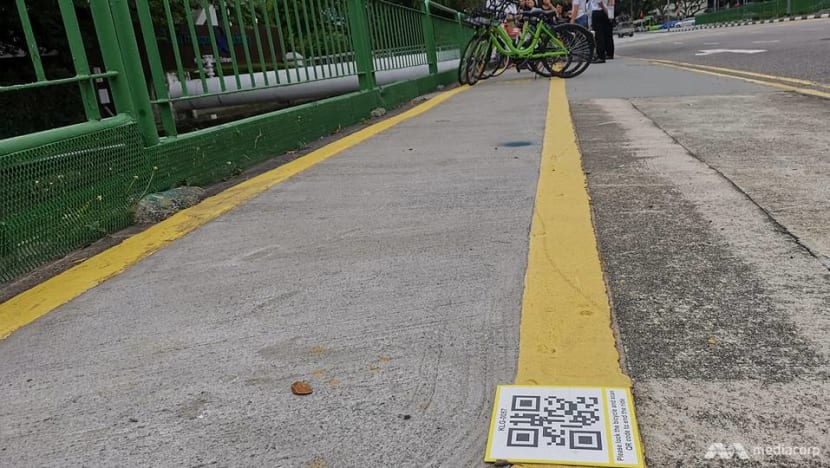commentary Commentary
Commentary: With Mobike’s impending exit, is it time to give public bike-sharing a shot?
After a roller-coaster journey, is Singapore’s private bike-sharing sector coming to a grinding halt?

Mobike's shared bikes are lined up in Shenzhen, Guangdong province, China. (Photo: REUTERS/Stringer/Files)
SINGAPORE: Less than a year since bike-sharing titan oBike’s sudden departure from Singapore, and a month after Ofo’s suspension, another operator has waved the white flag.
On Tuesday (Mar 12), the Land Transport Authority (LTA) confirmed Mobike had submitted an application to surrender its bike-sharing license.
The company has also withdrawn applications for a personal mobility device (PMD)-sharing license and said it would pull out of some Asian countries to re-evaluate its position, amid contractions in the market.
ANOTHER ONE BITES THE DUST
It has been a roller-coaster ride for bike-sharing in Singapore.
While we have passed the days where errantly parked bikes dot the urban landscape, the exit of so many bike-sharing companies has been traumatic and disconcerting to say the least.
oBike users who have put down deposits, myself included, haven’t seen any light at the end of the tunnel on their S$49.
Ofo too reportedly owes suppliers more than S$700,000 and let go of staff a few days before Chinese New Year.
Security deposits and licensing fees the Government collects from bike-sharing companies cannot be used to pay their debts to users and employees after their licenses are revoked, said Senior Minister of State for Transport Lam Pin Min, who fired a warning shot in Parliament last month.
Going by his remarks, it sounds like the list of collateral damage casualties may be pretty long.
READ: Lessons from the fall of once-mighty bike-sharing giants, a commentary
At the very least, responsible companies ought to clear out their bikes.
This Wednesday (Mar 13) marks the deadline for Ofo to remove all of its bikes from public places. The public will surely be wondering what swift action authorities will take if Ofo fails to comply.

WHAT DISRUPTION LOOKED LIKE
As the third high-profile bike-sharing operator Mobike begins the process of exiting Singapore, it’s starting to feel like deja vu. Haven’t we been here before?
And were there safeguards in place this time to protect society from the adverse effects of this disruption?
In Oct 2017, LTA, NParks and 16 town councils signed a Memorandum of Understanding (MOU) with bike-sharing operators that outlined a set of mutually agreed guidelines to reduce disamenities arising from bike-sharing services.
Within the MOU were requirements for operators to remove indiscriminately parked bikes within half a day and faulty bikes within a day.
Operators were also required to incorporate geofencing technology to detect and expeditiously tackle cases of errant parking.
So it is unclear how bike-sharing got out of hand and indiscriminate parking became so rampant.
Experts have highlighted out how the costs borne by bike-sharing companies may have escalated over time, as vandalism, missing bikes and indiscriminately parked bikes generated additional compliance costs.
NUS Business School Professor Nitin Pangarkar also pointed out in a commentary for Channel NewsAsia that oBike’s closure illustrated how poorly conceived ideas may get funded and survive for some time, as market euphoria and over-eager venture capitalists fuel their rise, only to fizzle out after a price war bleeds the company dry.
READ: Nitin Pangarkar's commentary on oBike’s closure, a cautionary tale about poorly conceived business ideas

Still, it’s useful to acknowledge that there is no blueprint to running a new business in a different country, said Jonathan Chang, executive director at NUS Enterprise, on a recent episode on The Pulse podcast.
Perhaps more time should have been spent working with relevant stakeholders to support the envisaged growth of the company, he added. He may be onto something.
Mobike operates a small number of 1,000 bikes in Sapporo in Japan but the company had been careful to tie up with local retailers who provided space for designated parking, and secured the approval of city authorities first.
Despite speculation that the company will retreat to focus on the Chinese market, there are no reports it plans to exit Japan just yet, suggesting that market may be more conducive to supporting its business model.
Perhaps part of it is also managing our own expectation and adopting a cautious approach as consumers.
“Consumers have this great faith” in companies they support and sometimes, companies take advantage of this overwhelming support, Mr Chang said while on The Pulse.
“When things are doing well, people don’t seem to pay attention to the possible pitfalls,” he said, pointing to a clause in the oBike rental service agreement that stipulated that deposits would be converted into non-refundable membership subscription fees.
LISTEN: The roller-coaster ride of bike-sharing in Singapore, an episode on The Pulse podcast
He acknowledges that it was reassuring that the Consumers Association of Singapore stepped in when oBike pulled out.
Still, it will take some time before those scarred by these painful retreats can trust bike-sharing operators again.
BIKES AS PUBLIC GOODS
Perhaps the issue is that shared bikes were public goods in the first place.
Authorities had plans to roll out a public docked bike-sharing scheme in 2016, and start small with a tender calling for 1,000 bikes, but the initiative was put on the backburner with the entry of private operators.
The starting costs to set up a bike-sharing infrastructure are admittedly huge, which include not just the costs of procuring bikes but also the costs to mark out parking zones and build bike racks.
And the fees operators were charging pushed down artificially by investor funding may have gained them huge market share which all but disappeared after they were removed.
But now that the supporting infrastructure is in place, why not give public bike-sharing a shot?

END GAME
To be sure, the whirlwind journey Singapore’s bike-sharing sector has undergone is not unique.
China’s market also illustrates a similar trajectory, after a winnowing process left millions of zombie bikes strewn around the country.
The first Chinese bike-sharing company Xiaoming to bow out left 430,000 bikes across more than 10 cities and US$115 million (S$156 million) in unreturned deposits.
Perhaps after holding out and hoping that the private sector could be a useful partner to catalyse a cycling culture in Singapore, it’s time to go back to that idea of a public bike-sharing scheme.
Hope still abounds that SG Bike, with its 3,000-bike fleet, can turn things around.
SG Bike chief operating officer Sean Tay told Channel NewsAsia last year that the company has seen some 3,000 rides each day and is doing “much better” than when it first started.
Still, I’m never putting a deposit in a private bike-sharing app ever again.
Lin Suling is executive editor at Channel NewsAsia Digital News where she oversees the Commentary section.















